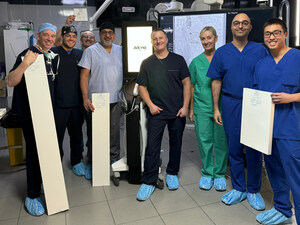Innovative platform designed for more personalized, tailored management of heart failure patients
LOS GATOS, Calif., July 10, 2023 /PRNewswire/ -- Adona Medical, a Shifamed portfolio company that aims to deliver advanced interatrial shunting and hemodynamic monitoring systems for heart failure, announced today that its next-generation heart failure management platform was featured at the CSI Frankfurt 2023 conference. Brian Fahey, Co-Founder and Chief Executive Officer of Adona Medical, introduced the company's developing interatrial shunt technology with a presentation during the Focus Heart Failure Interventions session.
The Adona heart failure management platform includes an adjustable interatrial shunt with integrated bi-atrial pressure monitoring. The shunt flow channel features an adaptable geometry with the intention that it can be made larger or smaller at any time post-implantation. This aims to allow for the shunting flow or dose to be optimized for patient needs at the time of the initial procedure, and adjusted in the future as the patient's condition evolves over time. Further, the integrated sensors are designed to automate the capture of pressure readings from both the left and right atria multiple times a day without requiring patient interaction. These daily readings can provide physicians with a more complete understanding of a patient's hemodynamic status and can help augment shunt therapy by enabling more informed pharmaceutical management.
"This is a novel device that combines some unique features such as an adjustable shunt mechanism and hemodynamic monitoring," said Marat Fudim, MD, MHS, an Advanced Heart Failure Specialist and Assistant Professor of Medicine at Duke University and co-moderator of the Focus Heart Failure Interventions session. "This is very intriguing given the ongoing debate about the right shunt size for individual patients and the 'booming' space of remote patient monitoring."
Heart failure is a progressive condition that impacts approximately 6.5 million patients in the United States and as many as 26 million patients globally.1 These patients generally suffer from impaired functional independence, poor quality of life, and may experience frequent hospitalizations associated with heart failure.2
"Adona Medical is committed to providing heart failure patients and physicians with technologies that address the shortcomings of currently available solutions. You'd struggle to find a physician comfortable with deciding on a fixed dose of medication for a patient and never being able to alter it in the future or monitor its effects, but this is comparable to the use case for interatrial shunts currently under clinical investigation," said Fahey. "At Adona, we believe that patient care can be pushed forward by a customizable and adjustable shunting approach combined with an advanced hemodynamic monitoring solution. We were thrilled to be invited to present at CSI Frankfurt this year to share the progress we've made on our heart failure platform."
About Adona Medical, Inc.
Adona Medical, a privately held portfolio company of Shifamed, LLC, is a pre-clinical stage medical technology company developing next-generation interatrial shunting and remote patient monitoring solutions for patients with advanced heart failure. The Adona heart failure management platform is an investigational device and is not approved for use in the U.S. or anywhere in the world. To learn more, please visit www.adonamed.com.
About Shifamed, LLC
Founded by serial entrepreneur Amr Salahieh, Shifamed is a highly specialized medical innovation hub focused on developing solutions that forge a path toward a world where patients are able to lead longer, healthier lives. To learn more about Shifamed, please visit www.shifamed.com.
MEDIA CONTACT:
Jennie Kim
SPRIG Consulting, LLC
[email protected]
References:
1Benjamin et al. Circulation 2018.
2Jackson et al. Circ Heart Fail 2018.
SOURCE Adona Medical

WANT YOUR COMPANY'S NEWS FEATURED ON PRNEWSWIRE.COM?
Newsrooms &
Influencers
Digital Media
Outlets
Journalists
Opted In






Share this article